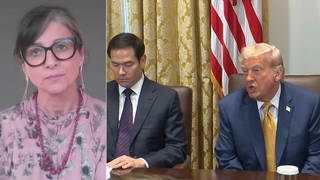
Guests
- Mohammed El-Kurdpoet, author and Palestine correspondent for The Nation. His family’s home is in the Sheikh Jarrah neighborhood of occupied East Jerusalem.
Israeli forces continue to expel Palestinians from their homes in occupied East Jerusalem, a move that the United Nations has described as a possible war crime. We speak to Palestinian poet and activist Mohammed El-Kurd, whose own family is among those facing eviction in the Sheikh Jarrah neighborhood. Sheikh Jarrah is also where the Salhiyeh family recently gained attention for threatening self-immolation while protesting their eviction and the demolition of their home. The dispossession of Palestinians has left families facing homelessness in the cold of winter. “This is not a unique situation for our neighborhood,” says El-Kurd. “It is happening all across colonized Palestine.”
Transcript
AMY GOODMAN: This is Democracy Now!, democracynow.org, The War and Peace Report. I’m Amy Goodman.
An Israeli court has rejected a petition by a Palestinian family to let them rebuild their home in the Sheikh Jarrah neighborhood in occupied East Jerusalem, a week after the Israeli military destroyed their home, demolished it. On January 19th, Israeli forces raided the home of the Salhiyeh family early in the morning while the family slept. Several members of the family were assaulted. At least six were arrested. Mahmoud Salhiyeh and his daughter Yasmin spoke about what happened.
MAHMOUD SALHIYEH: [translated] At 2 a.m., my son woke me up and said that the army are entering the house. I couldn’t leave the room. They came in and arrested me. They stepped on my back, and the officer said, “I told you I will come evict you from your home, and I will let you leave your house like a dog, barefoot.” He stepped on my back and told me, “Put your head down.” I told him, “I never put my head down.”
YASMIN SALHIYEH: [translated] The house was demolished. I saw videos and live videos. My heart is broken. I don’t know how to express myself. The house that I was raised in now is torn up. Everything in the house is gone. The feeling is so hard to see that my father’s hard work for 25 years is demolished. Our memories, my father’s heritage in this land, everything is gone. Even the cats and animals that were raised on the land are gone.
AMY GOODMAN: At least another 18 Palestinians who were at the home in solidarity with the family were also detained. Palestinians say it’s the latest in a series of evictions aimed at expropriating land for Israeli settlers in violation of international law.
We’re joined by Mohammed El-Kurd, a Palestine correspondent for The Nation, author of the recently published book of poems, Rifqa. His family’s home is in the Sheikh Jarrah neighborhood of occupied East Jerusalem. He’s joining us, though, now from New York City.
Mohammed, welcome back to Democracy Now! Can you explain what happened to the Salhiyeh family? In fact, before the Israeli military destroyed their home, they said that they would burn it down to resist the eviction and the destruction. Tell us why their home was destroyed and what happened.
MOHAMMED EL-KURD: Absolutely. And thank you, Amy. It’s good to be back.
You know, we’ve all seen the videos of the Salhiyeh family’s home being demolished. It’s important to note that the Israeli occupation court ruled that their land would be expropriated for, quote-unquote, “public use,” for the building of a special needs school. The house, in fact, did not have a demolition order on it.
What many Palestinians see this as is, in fact, an act of revenge, because the Salhiyeh family stood its ground on the eviction day and confronted the forces and said that they would burn themselves alive, should they be thrown out of their homes. And so, this violent spectacle, this coming in and smacking down the doors at dawn under the cover of darkness and insulting you and arresting and detaining the people in solidarity with you, is not just to intimidate Palestinians and quell the resistance, but it’s also to send a victory image to the Israeli audience, that was very intimidated by the Salhiyeh family’s powerful stance against dispossession. This is in fact an act of revenge. It also must be pointed that this is illegal under international law, given that Israeli jurisdiction over Palestinian land is illegitimate.
AMY GOODMAN: Can you talk about the neighborhood of Sheikh Jarrah, where you and your twin sister and other Palestinians live? You’ve been detained many times, though your family’s home has not been destroyed.
MOHAMMED EL-KURD: Absolutely. Sheikh Jarrah is one of the many neighborhoods in Jerusalem that is facing violent dispossession in a systemic raid to replace native Palestinians by — to replace them by settlers. In Sheikh Jarrah particularly, this is a case that has been going on for now 50 years. Our families have been going to court every single month trying to defend our homes, going up against billionaire-backed settler organizations. But I must say that this is not a unique situation for our neighborhood; it is happening all across colonized Palestine. Our family — my family today, our neighbors still await a court decision pending, to see whether or not we are going to remain in our homes. And this is just the reality for many, many, many hundreds of thousands of Palestinians.
AMY GOODMAN: What will happen to the Salhiyehs now? How long had they lived in their home?
MOHAMMED EL-KURD: They have lived — they’ve lived in their home for many, many decades, even before the Israeli occupation got to East Jerusalem in ’67. No one knows. You know, many Palestinians that are expelled from their homes are working-class families with nowhere else to go, with no one to turn to, and they are rendered homeless in the street. And this is happening in the cold of winter, no less, nonetheless.
AMY GOODMAN: Can you talk about what is happening, in related news, in the occupied West Bank, where Omar Abdulmajeed Asaad was just killed? Israeli forces — it’s believed he was 80 years old. He’s Palestinian American. They stopped him while driving home, then dragged him out of the car, gagged and handcuffed him, left him to die. What do you know about this American citizen?
MOHAMMED EL-KURD: I know that he has gone through what many Palestinians have gone through of brutal Zionist force. I believe that he was killed by the Israeli occupation forces. You don’t take a Palestinian elderly 80-year-old man, gag him, blindfold him, drag him in the street and leave him in the cold with no intention to harm him. He was unresponsive while the Israeli forces were still there, according to eyewitnesses, and they just left him there to die. Of course, now the Israeli military is going to investigate itself, and it’s going to find that it in fact have committed no atrocities and no crimes, and no one is going to be punished for what happened to this elderly man who very tragically was killed.
AMY GOODMAN: Mohammed, we usually speak to you in Sheikh Jarrah. Can you talk about what’s brought you to the United States? And also, the anthology of your poetry, can you talk about Rifqa and why you named it Rifqa?
MOHAMMED EL-KURD: Well, I am here in the United States pursuing a master’s degree. And I’ve come also to write and — I have come to write and publish writing in English about dispossession, about the ethnic cleansing in Palestine. And this is why the name of my book, you know, is called Rifqa. It’s named after my grandmother, who was dispossessed of her home in 1948 and then again in 2009. And had she been alive today, she would be facing the prospect of yet another Nakba, yet another act of violent displacement.
This is also very true for the Salhiyeh family, whose home was just demolished. They once lived in the western part of Jerusalem, before 1948, before they were forcibly expelled from their homes by Zionist militias. And now this is their second time experiencing the same agony and the same ethnic cleansing at the hands of the very same Zionist militias, only under a different name this time.
AMY GOODMAN: Let me also ask you about what’s happening in the Naqab, in the Negev region.
MOHAMMED EL-KURD: Yeah, thank you for bringing that up. I think it’s really important to note that there are thousands of Palestinian Bedouins currently in the Naqab region in the south of historic Palestine that have cultivated their lands and inhabited for decades and decades on end, yet have not had their ownership, quote-unquote, “recognized” by the Israeli government, that are now facing displacement at the hands of the JNF, the Jewish National Fund, which, as Al Jazeera’s journalist Zena Tahhan reports, is a quasi-government agency that is mandated with leasing and developing land with Jews only and owns 13% of Israeli, quote-unquote, “state lands.” Most of these lands were obtained through the anti-Palestinian absentee property law that expropriated property from Palestinian refugees who were forced out of their homes in 1948.
All of these thousands of Palestinians, Bedouins today face the prospect of homelessness and also face a violent crackdown, because they have said no, time and time again, to this forestation effort by the JNF — which, by the way, many have called greenwashing. They are uprooting Palestinians to replace them with invasive species of trees.
It’s also really important to note that the JNF is a charity — is registered in the United States as a charity organization, as a tax-exempt organization, that is committing international law violations abroad, and thus violating American law.
I also want to echo the calls and demands for the global days of actions made and called on by the activists from the Naqab in the south who are facing this dispossession. They are asking that their demolition orders be ended, that the forestation efforts be ended and that ethnic cleansing at large in Palestine must come to an end. There are global actions all around the globe today and tomorrow and the day after tomorrow demanding an end to ethnic cleansing, be it in the Naqab, in the South Hebron Hills, in Jerusalem or in the West Bank.
AMY GOODMAN: Well, Mohammed El-Kurd, I want to thank you so much for being with us, Palestine correspondent for The Nation magazine, author of the recently published book of poems, Rifqa. His family’s home is in the Sheikh Jarrah neighborhood of occupied East Jerusalem.
When we come back, Downfall: The Case Against Boeing. A new documentary just premiered at Sundance that looks at the two fatal crashes of the Boeing 737 MAX in Ethiopia and Indonesia, killing all 346 people on board. We’ll speak with the director of Downfall, Rory Kennedy, as well as the father of one of the victims, Michael Stumo. Stay with us.












Media Options